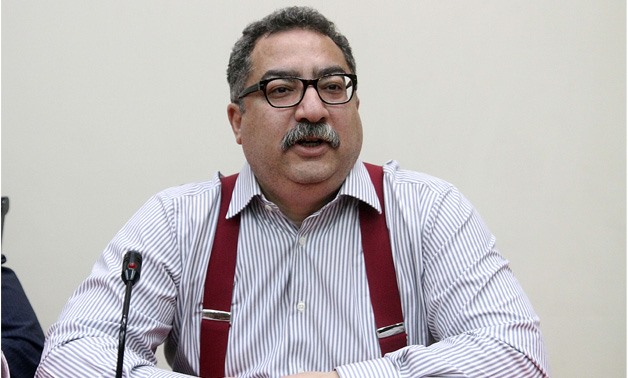
Ibrahim Eissa - YOUM7 (Archive)/Sami Wahib
CAIRO – 5 March 2017: Egypt’s General Prosecutor ordered the release of prominent journalist Ibrahim Eissa on 10,000 EGP bail after he was interrogated for three hours, according to
.
Speaker of the Parliament Ali Abdel Aal said during a Tuesday session that parliament respects the freedom of the press, but Eissa has consistently lashed out against the parliament.
Eissa, who is also the Editor-in-Chief of Al-Maqal newspaper, was accused of insulting the parliament and intentionally raising doubts about it among the public through the newspaper following a legal complaint issued by Abdel Aal last month.
The complaint was filed after Feb. 28’s edition depicted the parliament as a cartoon on the front page, suggesting an Oscar be awarded to it for ‘Best Cartoon.’
{image 1- Al-Mawal Newspaper 18th Feb Edition Cover}
The Oscar-inspired satire suggested that the flotation of the pound as the best movie, Sherif Ismail as Best Actor for his role as the head of government, Hoda Abdel Nasser as Best Supporting Actress for her role in ‘Tiran and Sanafir’, Best Director to the National Security Agency for their role in directing the parliament and media satellite outlets, and best cinematic performance to the renewal of religious discourse.
Eissa denied all accusations made against him by the parliament, reiterating his constitutional right as a journalist to criticize the performance of the upper house, Al-
reported Tuesday.
Nasser Amin, a lawyer and member of the National Council of Human Rights, said the parliament used Article 184 of the Penal Code to launch legal action against Eissa. The article stipulates that any individual insulting the House of Representatives, the army, the courts, any branch of the government or public entities is to be punished by up to year in prison or a fine of EGP 5,000–10,000,
reported Monday.
Amin said the questioning of Eissa constitutes a “flagrant infringement” of freedom of the press and freedom of expression, both of which are enshrined in the 2014 Constitution.
Lawyer Tarek Genida argued in a Facebook post said that Article 184 is partly unconstitutional as it goes against other publishing-related articles which guarantee freedom of the press.
This is not the first time Eissa has faced accusations from the parliament. Former parliamentary speaker Fathy Surour sued Eissa, then Editor-in-Chief of the weekly Omma newspaper, for defamation after Eissa published an article accusing Surour and his sons of taking government loans without any documented guarantees.
Comments
Leave a Comment